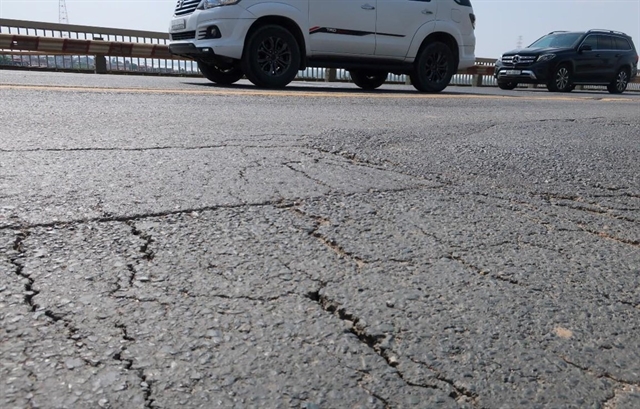 Society
Society

In recent years, incidents relating to transportation projects have raised concern over the quality of infrastructure.

|
| The uneven road surface on Thăng Long Bridge. VNA/VNS Photo Việt Hùng |
HÀ NỘI —The failure of design consultants and contractors to deliver acceptable and agreed standards lead to poor transportation projects in Việt Nam, experts told Vietnamplus online newspaper.
In recent years, incidents relating to transportation projects have raised concerns over the quality of infrastructure.
A newly-built bypass in the Central Highlands province of Gia Lai, which cost VNĐ250 billion (US$10.8 million) and runs through Chư Sê District and connects to the Hồ Chí Minh Road, was found to be in a state of disrepair with cracks and subsidence last week, even though construction was recently completed.
The 139km highway in the central region crossing Quảng Ngãi and Quảng Nam provinces and Đà Nẵng City kicked off in 2013 with total investment of VNĐ34.5 trillion (US$1.5 billion). Soon after it was put into use in August 2017, potholes and other defects were detected on the expressway’s Tam Kỳ-Quảng Ngãi section.
Similar situations happened with the 1,440km National Highway 1 from Thanh Hoa to Cần Thơ, the Bến Lức – Long Thành Expressway project, the Nội Bài – Lào Cai Highway, and the Thăng Long Bridge in Hà Nội.
Notably, after many repair efforts which cost up to hundreds of billions of đồng, cracks and potholes were still found in June on the surface of the Thăng Long Bridge.
Speaking at a National Assembly meeting in June, Minister of Transport Nguyễn Văn Thể admitted there were transportation projects with low quality due to contractors’ lack of capacity.
He also blamed overloaded trucks, rain, climate change and traffic density for the degrading quality of transportation projects.
But economist Ngô Trí Long told Vietnamplus that every contractor had to conduct feasibility studies with every project, including evaluations to ensure compliance with approved construction standards.
“So I don’t think it’s rational to blame natural conditions for the degrading situations of transportation projects,” he said.
Dr Trần Chủng, former head of the State’s Construction Work Evaluation agreed and said there was weak justification for blaming natural conditions.
“First and foremost, defects at transportation projects are caused by poor design and consultancy – the feasibility studies for these projects must have been done poorly as well,” he said.
Major factors affecting performance quality of construction were often related to the use of unskilled and incompetent commercial contractors, poor on-site supervision and a lack of commitment by supervising teams, Chủng said.
Government supervision
According to transportation experts, some projects are divided into many component contracts and assigned to different contractors, including incompetent ones. This creates many difficulties for project quality management.
The experts suggested contractors shoulder the responsibility for ensuring project quality, especially the consultancy and supervising teams.
Minister Thể said the ministry would continue to improve its instruction documents relating to transportation projects quality, increase survey and design quality and strictly select competent contractors.
Dr Trần Chủng said technical criteria systems and legal documents on transport construction are available and sufficient, yet it's largely up to contractors to live up to these requirements, making the Government's supervising role critical.
Strict punishments for individuals and organisations who violate laws on transportation project quality must be enforced to gain the trust of the public and ensure economic efficiency, he said.—VNS




